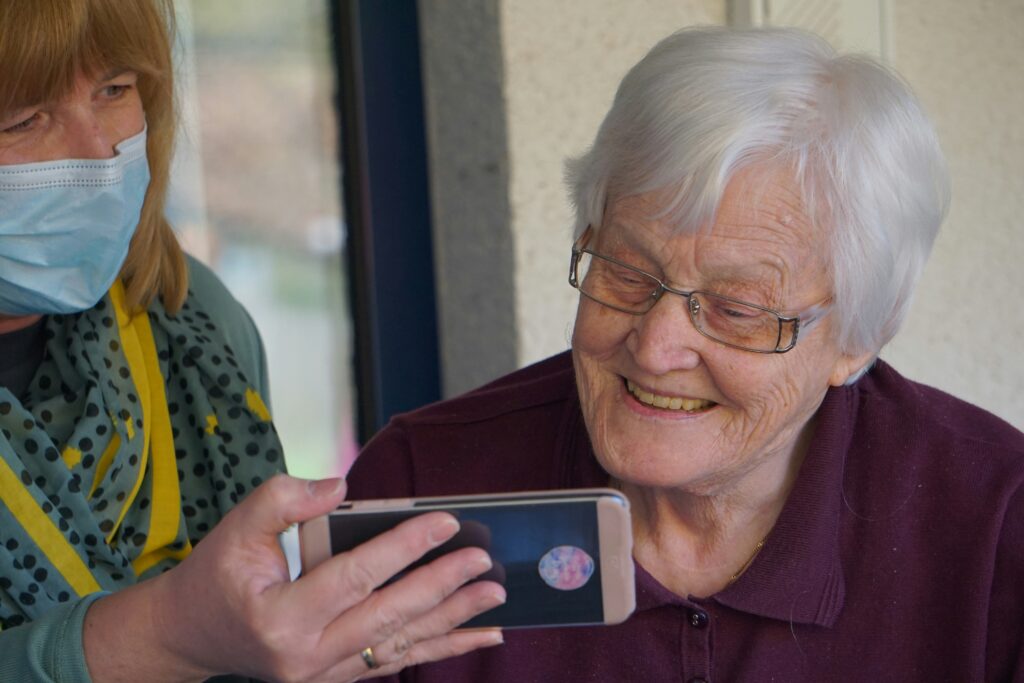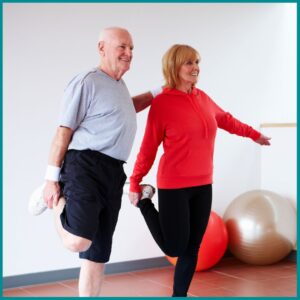As individuals age, whether it’s a loved one or oneself, it’s common to observe a gradual decline in independence, often stemming from physical or cognitive challenges. These challenges may arise from various factors, including injuries, strokes, surgeries, brain disorders, emotional health concerns, or basic aging ailments.
With that being said, it is important to be proactive with one’s physical, mental, and emotional health. Many resources can be used to get the ball rolling depending on the individual is stage, such as Physical Therapy, Occupational Therapy, and Companion Care.
Here at Full Distance Physical Therapy and Wellness, we encompass all stages of an individual’s holistic wellness journey, supporting those who wish to live an active, purposeful, and serene life. Full Distance offers everything from Personal Training and Fitness Classes to Physical Therapy, Occupational Therapy, Massage Therapy and Companion Care Services.

How Does Physical Therapy Improve Quality of Life for Seniors
Most individuals think physical therapy is necessary only after an injury or surgery, like a fall or hip replacement. However, physical therapy can assist with a wide variety of conditions such as osteoporosis, neurological conditions, stroke patients, posture, lymphedema, and basic aging ailments.
Through tailored exercises Physical Therapy can improve an individual’s strength, flexibility and mobility which can be beneficial for many reasons such as:
• Reducing the Risk of Falling
• Decreasing Pain from Chronic Conditions
• Preventing Injury
• Maintaining an Independent Lifestyle
Geriatric Physical Therapy is a specialized branch of therapy that prioritizes the distinctive requirements and obstacles faced by older adults. This therapeutic approach aims to optimize not only physical health but also functional capacity, autonomy, and the overall quality of life among elderly individuals.
In some cases, Physical therapists (PTs) may suggest occupational therapy (OT) for their clients who report physical, cognitive, or emotional limitations affecting their daily functioning. This recommendation can stem from both client feedback and the PTs’ own observations during evaluations or treatment sessions. Frequently, the areas of concern addressed by PTs align with those targeted in OT sessions, with a specialized focus on how these challenges impact an individual’s day-to-day functioning.

How Occupational Therapy Helps Individuals Gain Greater Independence
Occupational Therapists (OTs) partner with you and your loved ones to craft tailored solutions, tackling specific challenges arising from injury, illness, disability, mental health concerns, social dynamics, or the natural aging process. OTs adeptly transform obstacles into triumphs through personalized strategies, attentive listening, keen observation, clinical expertise, and the integration of valuable resources.
At Full Distance, our Occupational Therapists specialize in observing clients within their homes, workplaces, classrooms, and even vehicles to propose straightforward adjustments that enhance success and safety in their daily routines. As integral members of our collaborative team at Full Distance, we are dedicated to providing exceptional care and support.

How Can Occupational Therapy Benefit Stroke Patients
According to the National Library of Medicine, strokes are estimated to be one of the major reasons for long-lasting disability worldwide; however physical therapy can provide a wide range of interventions based on impairments, activity limitations, and goals in recovery during different stages of a stroke patient.
Occupational therapy (OT) can provide significant benefits for stroke patients in several ways:
- Restoring independence in daily tasks through alternative techniques and adaptive equipment.
- Improving motor skills via exercises and repetitive practice.
- Addressing cognitive challenges with memory training and attention exercises.
- Enhancing visual perception for safer engagement in activities.
- Supporting emotional well-being through coping strategies and stress management.
- Facilitating community reintegration and participation in meaningful activities.
- OT offers a holistic approach, focusing on independence, quality of life, and successful reintegration.
Overall, occupational therapy offers a holistic approach to rehabilitation for stroke patients, focusing on restoring independence, improving quality of life, and facilitating a successful transition back to daily activities and meaningful roles.
In some instances, a PT or OT may recommend a more extensive support, if needed, also known as Companion Care.

What is Companion Care and What Does it Provide
Companion care, a form of in-home assistance, prioritizes social interaction, emotional support, and daily aid for individuals in various circumstances. This support is particularly valuable for seniors, individuals with disabilities, those recuperating from surgery or serious injuries, and those experiencing cognitive declines such as dementia or Alzheimer’s.
Here at Full Distance, our caregivers assist with daily tasks like light housekeeping, meal preparation, and medication reminders. This support is especially beneficial for those facing physical limitations, cognitive decline, or struggling with depression.
As referenced in the article The Benefits of Physical Therapy for Older Adults, it can be tricky to navigate a new wellness program for an older loved one. Start by being as supportive as you can but try not to intrude more than necessary.
How to Manage Senior Care
In the event an individual needs assistance with coordinating their care, there are many agencies that offer Care-Coordination services. When evaluating care coordination services, consider factors such as the agency’s reputation, experience, availability, communication, and compatibility with your senior’s preferences and requirements.
At Full Distance, we provide Care Coordination services for individuals requiring assistance in managing their care. Our care coordinator oversees all aspects of an individual’s care, ensuring they receive optimal and efficient support. This service is especially crucial for those with chronic conditions, as it involves coordinating with multiple healthcare providers and specialists to effectively manage their health needs.
In summary, physical therapy and occupational therapy provide a comprehensive approach to rehabilitation, aiming to restore independence, enhance quality of life, and support a smooth transition back to daily activities and meaningful engagements for patients.







